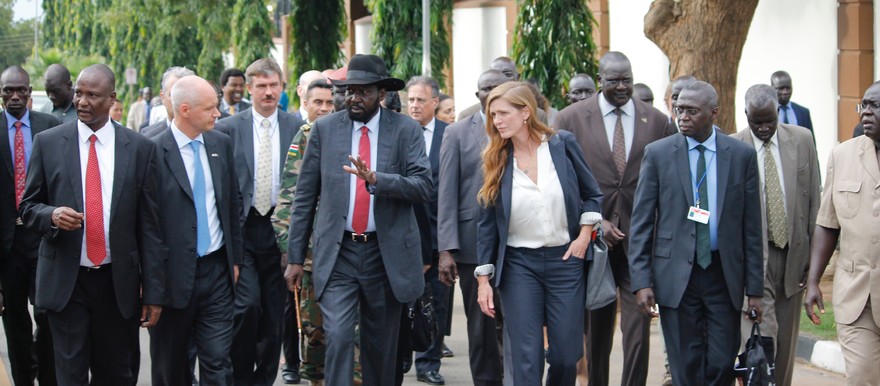When US Ambassador to the United Nations Samantha Power landed in South Sudan with other members of the UN Security Council, she laid out the trip’s purpose.
“We really need to see progress on the deployment of the Regional Protection Force, on lifting obstruction of humanitarian actors and of UNMISS, and hopefully moving forward on the political agreement which is going to have to be the foundation for stability going forward,” Power said at the opening press conference.
But four days later when Power and the Security Council left South Sudan, those three issues — deployment of the protection force, humanitarian access, and moving forward on a political agreement — did not appear to be accomplished. Instead, it was a four day trip in which South Sudan fiercely rejected the Security Council’s efforts, and it appears as unlikely as ever that the regional force will ever enter the country.
"I think the government won the game,” Cabinet Minister Martin Elia Lomuro told reporters at a press conference on Monday.
On Sunday night, it appeared that Power believed the government had accepted the UN’s regional protection force.
“The Security Council came to achieve what we have secured in terms of the agreements that we could get as a Security Council. We came to get consent to the (protection force) and that is a consent that has been given,” Power said.
A joint communique however between the Security Council and the government of South Sudan said that both sides would “continue to work though the modalities of the deployment,”
On Monday, Minister of Information Michael Makuei held a press conference alongside Cabinet Minster Martin Lomuro, saying that the government still needed to agree to the number of troops, where they came from, and what type of armament they had. If they did not agree to the force, South Sudan would treat it as “invaders” if they came.
The Security Council was able to come to an agreement with the government over granting humanitarian access, but a senior Security Council diplomat said that President Salva Kiir doesn’t believe that aid is being blocked in the country. Since signing the August 2015 peace agreement the government has consistently agreed to allowing humanitarian access, and it didn’t appear the agreement reached on Sunday had an immediate effect.
As the UN Security Council visited Wau, the governor Andrea Mayar Acho said that humanitarians had free access in the state. But on the very day the council visited, aid agencies said that an aid convoy was denied access outside of Wau.
Power also admitted that the council didn’t impact the political situation either.
“Fundamentally, it’s going to be the tribes themselves and the political leadership of this country that are going to have to come to together at long last,” Power said.
A group of prominent South Sudanese politicians have drawn attention to the fact that the UN Security Council delegation did not substantially address political issues during their visit. While welcoming the international efforts to bring a regional protection force to South Sudan, they said that "intervention for protection, by and in itself, is not sufficient condition to put the ARCSS [peace deal] back on track."
Kosti Manibe, author of the statement on behalf of the SPLM Former Political Detainees, one of the signatories of the peace agreement added, "A political programme that provides a roadmap for sustainable peace in the country remains and should be end-state of any effort to save South Sudan from itself and enable it to stand on its feet again."
The dissident SPLM group also called the government's statements Monday on the protection force "diversionary tactics that should not be entertained in regards to the handling of grave matters such as the wellbeing of the people of South Sudan or the existence of the country itself."
The US State Department has not responded to a request for comment from Radio Tamazuj. This article will be updated accordingly if they do respond.
Related coverage:
Makuei and Lomuro hint at objectives for next military offensives
USA and the coronation of Taban Deng
Insider: Did South Sudan snub the UNSC delegation?




